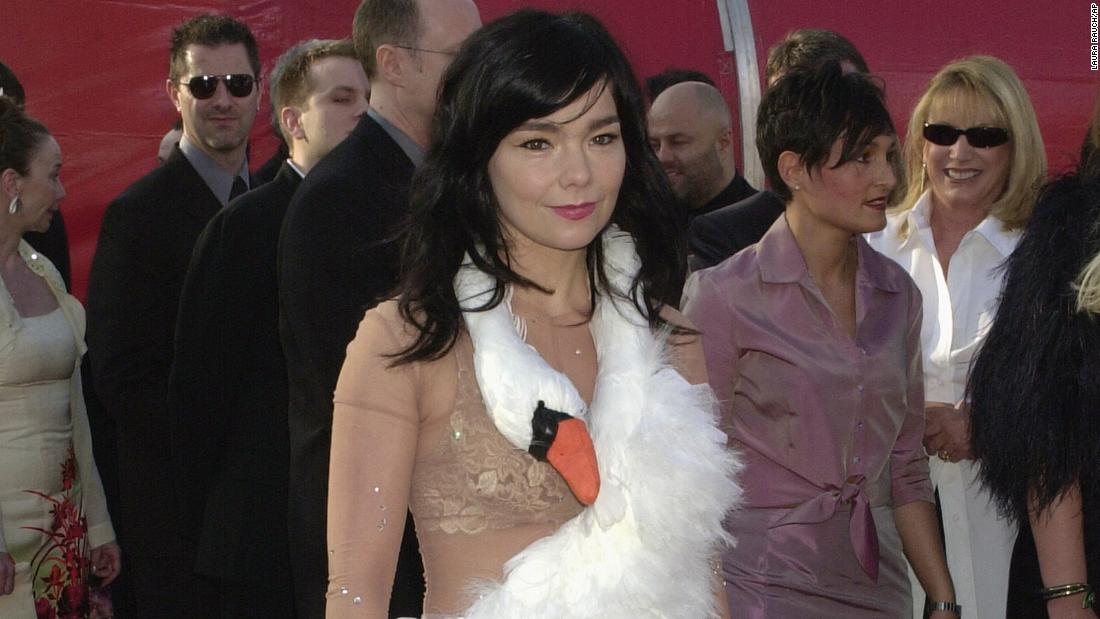
Real stories behind the most unforgettable Oscar looks
The Academy Awards are all about who takes home the golden statuette, but also who looks best doing so. Celebrities come at Oscar fashion culture from a variety of angles, whether they arrive at the ceremony dressed to the nines or blaze past traditional decorum.

Singer Bjork wore a Marjan Pejoski swan gown at the 73rd annual Academy Awards in 2001. She was nominated for Best Song for “I’ve Seen it All” from the film “Dancer in the Dark.” Credit: Laura Rauch/AP
“Beyond the Best Dressed” covers nearly 100 years of fashion moments, opening with a throwback to Mary Pickford’s 1930 jeweled azure dress — detailing how the Oscars’ “spectacle and splendor” most likely would not have existed without the “Coquette” star since she was the first to show up at the ceremony in full glam — and it ends with “Mad Max: Fury Road” costume designer Jenny Beavan’s 2016 appearance at the awards show. Beavan defied convention by wearing a pleather jacket and black trousers with imagery from the film, an idea crafted by the costumer herself.
Zuckerman’s research included filtering through newspaper clippings and wading through public library archives to analyze what was documented about fashion when various memorable Oscar ensembles were worn. A big priority for the author was including people who have been historically underrepresented.

“Beyond the Best Dressed” primarily focuses on women because of the way their fashion is “harshly judged,” Zuckerman said. Credit: Montana Forbes
“The Oscars themselves aren’t very diverse, as the #OscarsSoWhite campaign will tell you year in and year out, so I wanted to make sure that I included people who weren’t part of #OscarsSoWhite, essentially,” Zuckerman said. “I wanted to make it clear that even back in 1958, Miyoshi Umeki was the first Asian woman to win an Oscar all those years ago.”
Umeki, who won the Academy Award for best supporting actress for “Sayonara,” wore a dark-colored kimono adorned with gold accents to the ceremony. But according to Zuckerman’s book, Hollywood gossip columnists tarnished Umeki’s accomplishment by using dismissive and racist language to describe her and her outfit, calling the actor a “cute thing” in a “native costume.”
Umeki eventually scratched her name from the Oscar statuette and threw it away, Zuckerman wrote.
Unzipping expectations
“Beyond the Best Dressed” contains cultural context to memorable outfits, with the goal of taking a “holistic look at fashion that looks not just at what people are wearing but the people in the clothes,” Zuckerman said.
To do so, Zuckerman avoided focusing on only who made the best- and worst-dressed lists.

Costume designer Jenny Beavan defied sartorial convention by wearing a pleather jacket and black trousers to the Oscars in 2016. Credit: Randy Shropshire/Getty Images
“I wanted to make sure there were those sorts of people in the middle whose outfits told interesting stories but didn’t necessarily fall into one of those two categories,” she said.
Part of this strategy entailed uncovering outfits that had been largely forgotten, such as Diana Ross’ black gown that she changed into at the 1973 Oscars after wearing a silver three-piece suit on the red carpet earlier that day. The dress was not as widely photographed as it was expected to be in light of projections that Ross would win best actress — and thus become the first Black woman to win in that category — because the award went to Liza Minnelli instead.
Bob Mackie, who designed both of Ross’ ensembles, told Zuckerman that Ross “was the only one” at the time who would plan a costume change mid-Oscars.
Zuckerman featured a selection of men’s fashion toward the end of the book, such as the late Chadwick Boseman’s Givenchy Haute Couture look at the 2018 Oscars, distinguished by silver shoulder embroideries on an overcoat. But she said she primarily focused on women because of the way their fashion is “harshly judged.”

Actor Chadwick Boseman’s 2018 Oscar ensemble is among a selection of men’s looks featured in Zuckerman’s book. Credit: VALERIE MACON/AFP/Getty Images
“Especially if women are nominees, there’s always this sense of like what do you wear that becomes sort of the symbol alongside you that will forever be in the history books with you holding your trophy,” Zuckerman said. “There are pictures of Mary Pickford holding her trophy in 1930, so you sort of know that if you’re going to win, it will go down in history.”
“Beyond the Best Dressed” is available now from Running Press Adult.
Add to queue: Get ready for the Oscars
Film enthusiasts from all over gathered to create this podcast, which provides weekly episodes, reviews and interviews with leading figures in the film industry. The mission of host Matt Neglia’s team is to find what the next best picture Oscar winner will be.
Rob Epstein and Jeffrey Friedman’s original documentary tracks how Oscar night has evolved into a symbol of industry success. It all began when then-MGM studio chief Louis B. Mayer created what became the Academy of Motion Picture Arts and Sciences to thwart unionization efforts. The documentary contains memorable clips such as McDaniel’s acceptance speech and footage of backstage pandemonium.
IndieWire hosts Eric Kohn and Anne Thompson cover all aspects of film in their weekly podcast, where they speak about upcoming releases, the movie industry’s future, festivals and awards shows. The duo has gone in depth about Oscar snubs and surprises, projected front-runners and what to expect from this year’s ceremony.
Top image: Mary Pickford accepting the Best Actress Academy Award for “Coquette.”
